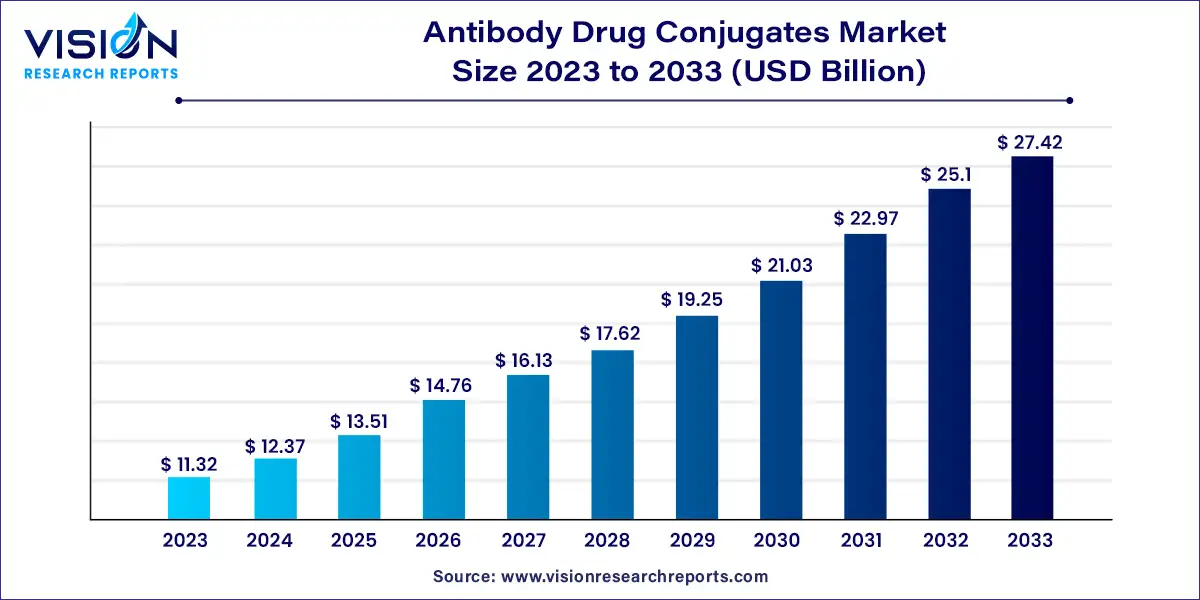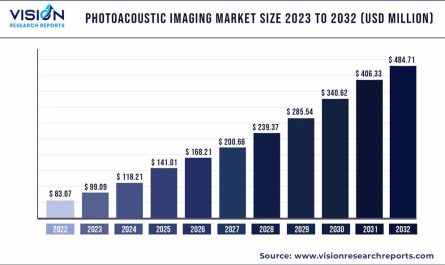The global antibody drug conjugates market size was reached at USD 11.32 billion in 2023 and is anticipated to reach around USD 27.42 billion by 2033, growing at a CAGR of 9.25% from 2024 to 2033.

Key Pointers
- North America led the global market with the largest market share of 53% in 2023.
- Asia Pacific antibody drug conjugate market is anticipated to witness significant growth from 2024 to 2033.
- By Application, the breast cancer segment held the largest revenue share of 48% in 2023.
- By Target, the HER2 (human epidermal growth factor receptor 2) target type segment generated the maximum market share in 2023.
- By Target, the CD22 target segment stands out as one of the fastest-growing segments over the forecast period.
- By Technology, the cleavable linker segment captured the maximum market share of 73% in 2023.
Get a Sample@ https://www.visionresearchreports.com/report/sample/41295
Emerging Trends in the Antibody Drug Conjugates Market
- Next-Generation ADCs: Researchers are actively exploring the development of next-generation ADCs with enhanced therapeutic properties and improved efficacy. These advanced ADCs incorporate novel antibody formats, optimized linkers, and more potent cytotoxic payloads to overcome challenges associated with first-generation ADCs, such as limited tumor penetration and resistance mechanisms. By leveraging cutting-edge technologies and innovative drug design strategies, next-generation ADCs hold the potential to address unmet medical needs and expand the scope of targeted cancer therapy.
- Novel Linker Technologies: Linkers play a critical role in ADC design by connecting the antibody to the cytotoxic payload and facilitating controlled drug release within the tumor microenvironment. Recent advancements in linker technologies have led to the development of more stable, selective, and efficient linker systems capable of minimizing off-target toxicity and improving drug delivery to cancer cells. Novel linker designs, including cleavable and non-cleavable linkers, enable precise payload release and enhance the therapeutic index of ADCs, contributing to their growing popularity in clinical practice.
- Bispecific Antibody Drug Conjugates: Bispecific antibody drug conjugates represent an innovative approach to targeted therapy by simultaneously targeting two different antigens expressed on cancer cells. These bispecific ADCs offer enhanced specificity and potency compared to traditional monoclonal antibodies, enabling selective targeting of heterogeneous tumor populations and overcoming resistance mechanisms. By engaging multiple signaling pathways and immune effector mechanisms, bispecific ADCs have the potential to achieve deeper and more durable responses in patients with refractory or relapsed cancers.
- Combination Therapies: The emergence of combination therapies involving ADCs and other anticancer agents is revolutionizing cancer treatment paradigms and improving therapeutic outcomes. Researchers are exploring synergistic combinations of ADCs with immune checkpoint inhibitors, tyrosine kinase inhibitors, and other targeted therapies to maximize antitumor efficacy and overcome resistance mechanisms. By leveraging complementary mechanisms of action and addressing multiple cancer hallmarks simultaneously, combination therapies have the potential to achieve superior responses and prolong survival in patients with advanced or metastatic disease.
- Personalized Medicine Approaches: Advances in molecular profiling and biomarker discovery are driving the development of personalized medicine approaches in the ADC field. By identifying specific molecular targets and patient-specific biomarkers, researchers can tailor ADC therapy to individual patient characteristics and optimize treatment outcomes. Personalized medicine strategies enable more precise patient selection, dosing optimization, and treatment monitoring, leading to improved response rates and reduced toxicity in clinical practice.
Advantages of Antibody Drug Conjugates
- Targeted Therapy: One of the most significant advantages of ADCs is their ability to deliver cytotoxic drugs directly to cancer cells while sparing healthy tissues. This targeted approach minimizes systemic toxicity and reduces the risk of adverse side effects commonly associated with traditional chemotherapy. By precisely targeting cancer cells, ADCs maximize the therapeutic effect while minimizing harm to surrounding normal tissues.
- Enhanced Efficacy: ADCs combine the specificity of monoclonal antibodies with the potency of cytotoxic drugs, resulting in a highly potent and effective treatment modality. By harnessing the tumor-targeting capabilities of antibodies, ADCs can deliver cytotoxic payloads directly to cancer cells, leading to enhanced antitumor activity and improved patient outcomes. This targeted delivery mechanism allows for higher drug concentrations within the tumor microenvironment, leading to increased cancer cell killing and tumor regression.
- Reduced Side Effects: The targeted nature of ADCs not only enhances their efficacy but also reduces the incidence and severity of side effects compared to traditional chemotherapy. By minimizing off-target effects on healthy tissues, ADCs help mitigate common chemotherapy-related side effects such as nausea, hair loss, and immune suppression. This improved safety profile enhances patient tolerance to treatment and improves overall quality of life during therapy.
- Extended Half-Life: Many ADCs are engineered with modifications to their structure that prolong their circulation time in the bloodstream. This extended half-life allows for sustained exposure of cancer cells to the cytotoxic payload, maximizing the therapeutic effect of the drug. By optimizing pharmacokinetic properties, ADCs can achieve higher drug concentrations within tumors and improve overall treatment efficacy.
- Versatility: ADC technology offers versatility in terms of drug design and customization, allowing for the development of tailored therapies for specific cancer types and patient populations. Researchers can fine-tune various components of the ADC, including the antibody, linker, and cytotoxic payload, to optimize drug potency, selectivity, and stability. This flexibility enables the creation of ADCs with diverse mechanisms of action and therapeutic profiles, expanding the potential applications of this innovative treatment modality beyond oncology.
Applications of Antibody Drug Conjugates
ADCs have demonstrated significant clinical utility across a wide range of cancer types, including breast cancer, lymphoma, and leukemia. In addition to oncology, ADCs are being investigated for the treatment of autoimmune diseases and other therapeutic areas, underscoring their versatility and potential impact on human health.
Future Outlook of the Antibody Drug Conjugates Market
Looking ahead, the antibody drug conjugates market is poised for continued growth, driven by ongoing research and development efforts aimed at expanding the therapeutic landscape of ADCs. With advancements in technology and increasing investment in biopharmaceutical innovation, ADCs are expected to play a significant role in the future of precision medicine.
Impact of COVID-19
Read More: https://www.heathcareinsights.com/retinal-biologics-market/
Antibody Drug Conjugates Market Key Companies
- Seagen, Inc.
- Takeda Pharmaceutical Company Ltd.
- AstraZeneca
- F. Hoffmann-La Roche Ltd.
- Pfizer, Inc.
- Gilead Sciences, Inc.
- Daiichi Sankyo Company Ltd.
- GlaxoSmithKline Plc
- Astellas Pharma, Inc.
- ADC Therapeutics SA
Recent Developments
- In January 2024, Celltrion, Inc., and WuXi XDC signed a Memorandum of Understanding (MOU) for integrated services for ADCs, encompassing the development and manufacturing of ADCs.
- In the same month, Jonhson & Johnson Services, Inc., acquired Ambrx Biopharma, Inc., which possesses proprietary ADC technology aimed at developing next-generation novel ADCs for cancer treatment. J&J’s strategic focus lies on its prostate cancer portfolio while leveraging this proprietary technology.
- Additionally, in January 2024, MediLink Therapeutics and F.Hoffmann-La Roche Ltd. forged a license agreement and collaboration to develop a next-generation ADC, YL211.
Antibody Drug Conjugates Market Segmentations:
By Application
- Blood Cancer
- Leukemia
- Lymphoma
- Multiple Myeloma
- Breast Cancer
- Urothelial Cancer & Bladder Cancer
- Other Cancer
By Product
- Kadcyla
- Enhertu
- Adcetris
- Padcev
- Trodelvy
- Polivy
- Others
By Target
- HER2
- CD22
- CD30
- Others
By Technology
- Type
- Cleavable Linker
- Non-cleavable Linker
- Linkerless
- Linker Technology Type
- VC
- Sulfo-SPDB
- VA
- Hydrazone
- Others
- Payload Technology
- MMAE
- MMAF
- DM4
- Camptothecin
- Others
By Region
- North America
- Europe
- Asia Pacific
- Latin America
- MEA
Buy this Premium Research Report@ https://www.visionresearchreports.com/report/checkout/41295
You can place an order or ask any questions, please feel free to contact sales@visionresearchreports.com| +1 650-460-3308
Web: https://www.visionresearchreports.com/
Blog: https://www.novaoneadvisor.com/

